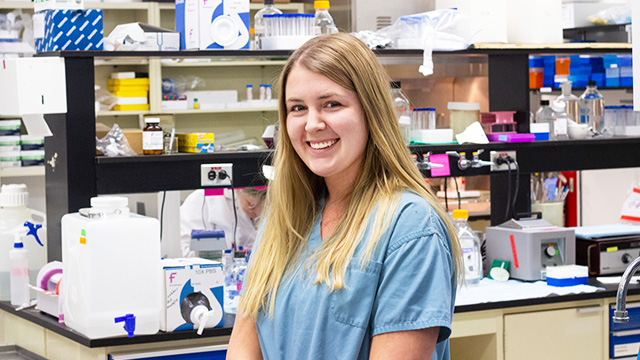
Jenna-Lynn Senger has always been a fiercely independent, driven person, but a fainting spell a few years ago taught the plastic-surgery resident and recent PhD an important lesson in finding balance and accepting guidance.
Jenna-Lynn Senger, '19 PhD, has always been fiercely driven-a quality that served her well until the day several years ago when she passed out in the shower, hit her head on the wall and ended up with a concussion. "I finally learned my own limits," she says ruefully. "I used to think I could go forever and if I just pushed a little harder, I'd be fine." But the plastic surgery resident, who had been pushing herself to take extra calls for surgery while also working long nights in the lab, had stayed awake for more than 90 hours and suddenly learned the hard way that she just couldn't sustain that kind of schedule. "I lost a solid week that I have no memory of," she recalls. "I've always struggled with asking for help, and that concussion taught me I can't do everything by myself."
Gratitude to those who have helped her along the way is a recurring theme for Senger. All the way back to high school in Saskatoon, she has had the support and encouragement of mentors, starting with University of Saskatchewan pathologist Rani Kanthan, with whom she was paired for professional work experience in Grade 12. She began assisting in Kanthan's clinical research that year, a working relationship that would continue through the two years of an undergraduate science degree she did and into medical school at the U of S.
Senger arrived at the University of Alberta in 2014 intending to pursue a master's alongside her residency, a process that for a plastic surgeon typically takes seven years. "I started to do a master's and discovered I absolutely love science," says Senger, "and I had amazing mentors who strongly encouraged me to keep going." Her research on the effects of electrical stimulation on peripheral-nerve regeneration was yielding exciting results and her supervisors Christine Webber and Ming Chan thought she should pursue it further with a PhD.
"I was always taught that you take whatever opportunity you have, and it's in those detours that you figure out where you're supposed to end up," she says. So even though a PhD hadn't been in her original plans, Senger listened to her trusted supervisors, took that detour and started delving deeper into her peripheral-nerve research.
Senger's research expands on previous studies showing that delivering electrical stimulation to a severed nerve during surgery supports faster nerve growth specifically at the point of the surgical repair. Damaged nerves grow very slowly-about a millimetre per day-and the more that can be sped up, the faster patients will recover. Senger wondered whether giving electrical stimulation prior to surgery rather than during might accelerate that nerve regeneration beyond the location of suture repair and further throughout the injured nerve. And that's exactly what she and her team found.
Senger is now taking this discovery into the area of breast reconstruction for cancer survivors. Surgeons can make breasts that look very natural, she says, but they have no sensation. Senger believes it might be possible to use her understanding of nerve stimulation to help solve that problem.
Typical breast surgeries bring part of the belly up to the chest and hook up the blood vessels so the tissues stay alive. In some centres across Europe and south of the border in Houston, Texas, says Senger, they're working on also bringing nerves from the belly up to the chest and connecting those, in hopes of bringing sensation to the breast. "I want to look at bringing this procedure to Canada, and I want to know if we can improve upon it," says Senger. She and her team are working on creating a rodent model to test whether the electrical stimulation she studied during her PhD-very effective in restoring nerve function in two parts of the same nerve that had been severed-might also work to connect nerves that were never meant to work together.
Despite the intensity of her workload, Senger has no regrets about pursuing a PhD during her residency. People have tried to discourage her over the years, reminding her that by putting in three more years of school she's missing out on three years of potential earning as a surgeon. Others have cautioned her that spending her career in a lab will translate to lower earning power than if she were to commit full time to practising surgery.
But for Senger, this path is the only one that makes sense. "In my mind, they go together and one enhances the other. I want to have a lab practice where I'm working with PhDs, a clinical practice where I'm working with surgeons, and teach while working with other academics. And I'll be like the ringmaster in the circus, taking the best ideas from all of them and putting them all together."
While she's learned from that fainting episode to take any opportunity she can for a head-clearing walk-or a quick getaway to go scuba diving at the tail end of a demanding conference-in the end, there still isn't anywhere Senger would rather be than the operating theatre and the lab. And she's forever grateful to Webber and Chan for helping her see that. "I would never have done the PhD without them. They put my interests above everything else," says Senger. "I am so lucky to have them."